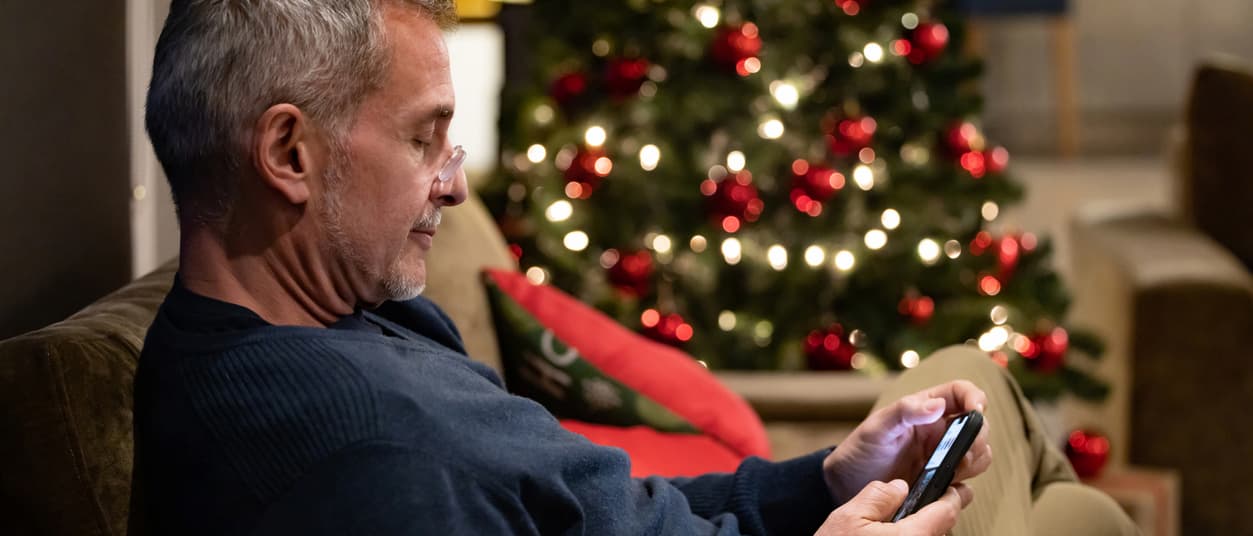
Coping with loneliness during the holiday season, especially while in recovery, can be very challenging. Maintaining sobriety and mental well-being is important over Christmas in order to avoid relapse triggers and any mental health dips that commonly occur during the holiday period.
To cope with loneliness and recovery over Christmas, there are strategies and actions you can take to manage your mental health and recovery journey during Christmas. Putting yourself first and managing how you feel will give you the greatest chance of maintaining recovery and enjoying the Christmas period.
See below for some tips on maintaining recovery over Christmas and how to manage your mental health.
Why Christmas Can Be a Lonely Time
Christmas is often marketed as a time for family gatherings, reunions, and festivities. However, the reality isn’t always so idyllic.
For many people, the holiday season can magnify feelings of loss, isolation, or inadequacy, especially if they’re facing personal challenges like recovery.
If you’re in recovery, Christmas can also remind you of times when substances played a central role in your celebrations. The absence of these behaviours can leave a gap, making you feel disconnected. Recognising that these feelings are normal and shared by many is the first step to overcoming them.
Is it Common to Experience Loneliness During Christmas?
It’s important to recognise that feeling lonely during Christmas is a common and normal experience for many people, especially if you are going through the recovery journey from drug or alcohol addiction for the first time.
Whilst Christmas for some people is the happiest time of the year, it is also a period that can highlight lost loved ones, exaggerate feelings of loneliness, and be isolating for those in addiction recovery.
Loneliness is also a significant issue in the UK, affecting millions of people – so you’re not alone. Based on the most recent data, approximately 27% of adults reported feeling lonely always, often, or some of the time between December 2023 and January 2024.
In England specifically, data from 2021/22 shows that around 6% of respondents (which is about 3 million people) reported feeling lonely often or always. This proportion has not changed significantly since earlier years.
Is Recovery Harder During Christmas?
Yes, it can be.
Maintaining recovery is typically more challenging during the Christmas period for several reasons:
- Increased exposure to triggers: Alcohol, indulgence, and late-night gatherings are an everyday occurrence for some people during Christmas, making it harder to avoid temptations.
- Stress and pressure: Financial strain, family dynamics, and high expectations can heighten emotional stress.
- Sense of isolation: For those living alone or separated from family, the holidays can make you focus more on loneliness.
Practical Ways to Manage Loneliness and Recovery
Christmas can be hard to cope with, especially if it is your first year in recovery. See below the ways you can cope with loneliness and recover at Christmas.
Build Your Support Network
Recovery thrives on connection. So, don’t hesitate to lean on your support system.
Reach out to trusted friends, family members, or support groups to let them know how you’re feeling. A simple conversation can provide comfort and reassurance, reminding you that you’re not alone.
If you’re hesitant to reach out, consider attending addiction support meetings or sober events. Organisations such as Alcoholics Anonymous or Narcotics Anonymous often hold special gatherings during Christmas, offering a safe space to share experiences and gain encouragement.
Plan Sober-Friendly Activities
We would strongly recommend looking for local sober events, gatherings, or meetings taking place during the holiday season.
As we touched on above, addiction support groups can provide an opportunity to connect with others who understand the challenges of recovery while also celebrating the holidays in a safe and supportive environment. So, rather than focusing on what you’re missing, create new, positive traditions that don’t revolve around alcohol or substances.
Some other ideas include:
- Hosting a movie night or a festive dinner with non-alcoholic beverages.
- Take a winter walk or explore holiday light displays.
- Baking festive treats or crafting homemade decorations.
Focusing on activities that align with your recovery goals can make the holidays feel enjoyable and meaningful.
Maintain Your Recovery Routine
Stick to your daily routine and relapse prevention recovery plan as closely as possible.
Consistency is key during recovery, and the holiday season is no exception. Stick to the habits that have supported your progress so far, such as:
- Attending therapy sessions or support group meetings.
- Exercising regularly, even if it’s just a short walk.
- Practising mindfulness or meditation to manage stress.
By maintaining these routines that you’ve worked hard to incorporate into your day-to-day life, you’ll create a sense of stability that can help you navigate potential triggers.
Don’t Withdraw from Your Loved Ones
A coping mechanism a lot of people have is to withdraw when they’re feeling down, which can come with feeling lonely. Avoid isolating yourself, as this can make you feel lonely, especially over Christmas.
As well as worsening the symptoms of loneliness, isolation also increases the risk of relapse. So, it’s incredibly important to make an effort to stay connected with others, even if it’s through phone calls, video chats, or online support groups.
Away from Family Over Christmas? Use Technology to Stay Connected
If you’re separated from loved ones due to distance or personal circumstances, technology can help bridge the gap.
Schedule video calls or participate in virtual events to feel more connected. Online recovery communities and forums can also provide valuable support during this time.
Set Realistic Expectations
Understand that the holidays may not be picture-perfect. Embrace the reality that there may be moments of loneliness, discomfort and relapse triggers.
It’s okay to acknowledge moments of discomfort or sadness, so don’t set yourself up to fail with unrealistic expectations. Instead of striving for perfection, focus on small, meaningful moments that bring you joy.
Managing Triggers During Christmas
Triggers are a natural part of the recovery journey, and the festive season can amplify them. Here are ways to manage common triggers effectively:
Recognise Your Triggers
Before the holidays, identify situations or emotions that might tempt you to relapse. Common triggers include:
- Attending gatherings where alcohol is served.
- Feeling excluded or isolated during celebrations.
- Coping with unresolved family conflicts.
Create a Plan for Your Trigger
Having a plan can make it easier to resist temptations. For example:
- Bring your own non-alcoholic drinks to social events.
- Practise responses for politely declining offers of alcohol.
- Have a trusted friend or accountability partner on standby for support.
The Importance of Self-Care
Self-care is not a luxury; it’s an essential part of recovery. Over Christmas, take time to nurture your physical, mental, and emotional well-being:
- Physical self-care: Stay active, eat balanced meals, and get enough sleep.
- Mental self-care: Engage in activities that stimulate your mind, like reading or puzzles.
- Emotional self-care: Journaling, practising gratitude, or speaking with a therapist can help you process your feelings.
This can really help to combat loneliness and any cravings or triggers you may experience.
Focus on the Bigger Picture
It’s easy to get caught up in the immediate challenges of the holiday season, but try to keep your long-term recovery goals in mind.
Remind yourself of why you began this journey and the positive changes you’ve already made. Every step you take, no matter how small, brings you closer to a healthier, more fulfilling life.
Consider Accessing Professional Support
If feelings of loneliness and distress become overwhelming, consider seeking the guidance of a therapist or counsellor who specialises in addiction recovery and mental health. Professional support can be instrumental in navigating these challenges.
At Action Rehab, we specialise in providing personalised support for individuals navigating addiction recovery. Whether you need advice, therapy, or a structured recovery programme, our team is here to guide you.
Get In Touch With Us Today
Christmas doesn’t have to be a season of struggle. By taking the right steps to manage loneliness and prioritise your recovery, you can turn this challenging time into an opportunity for growth. Remember, you’re not alone on this journey. There’s always support available to help you through.
If you’re ready to take the next step, reach out to Action Rehab for compassionate, professional support. Contact us on 0151 268 6992 to learn more.
Posted on Monday, December 9th, 2024 at 10:26 am in Addiction, Latest News.






 Call Us
Call Us Contact Us
Contact Us